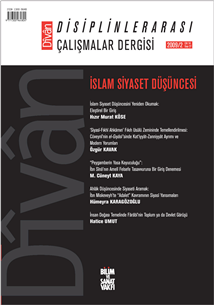27
Articles
The question of how to read Islamic political thought, similar to its historical importance, is still a pressing one today. In modern times, the answers given to this question by the orientalist schoolars constitute a major barrier in gaining an insight into this thought. In this essay, two approaches, called as fallacies, which pose obstacles in understanding the Islamic political thought, will be critically discussed. The first obstacle is the historical fallacy, which generalizes the historical experience Europe had in its transition from the Middle Ages to modern times and assumes that Islam also had a similiar exprience. The second one is the disiplinary fallacy, produced by the limited perspectives of the fragmented and narrowly specialized social sciences, which selectively analyses only particular aspects of the Islamic political thought and therefore misses its internal coherence as a whole. Consequently, I propose two things: First, Islamic political thought should be read against the background of Islamic political exprience without conflating it to Western historical exprience. Second, the internal coherence of Islamic political thought should be explored from a wholistic perspective.
Hızır Murat KÖSEOne of the main problems for whom studies on Avicenna and his approach to practical philosophy (al-hikma al-amaliyya or al-falsafa al-amaliyya) is his relative silence on this field and the reasons behind it. As the founder of the most comprehensive and effective philosophical system in the middle ages, Avicenna did deal with practical philosophy, which include ethics, economics and politics, scarcely in his philosophical writings. The target of this essay is to identify the reasons of Avicennas negligence practical philosophy through his ideas about the classification of rational sciences and his approach to the relationship between philosophy and religion, and to give some clues to the development of practical philosophy in Islamic philosophy after Avicenna.
M. Cüneyt KAYAThe main proposition of the article is that moral works should not be ignored in the works of Islamic political thought, especially in concepts like justice, happiness, love, in which the moral works can be seen points of contribution to political thought. From this perspective in this article, we will point to political implications of the concept of justice in the Miskawaih’s works, Tahdhib al-Ahlak and Risāla fi māhiyat al-‘adl. This will be set forth an example examination for supporting the main propositon.
Hümeyra KARAGÖZOĞLUIn this article, the social and political level, which al-Fârâbî discusses in direct relation to the realization of the intrinsic purpose in human existence, is tried to be grounded on the twofold human nature; that is the natural and voluntary nature of man. In accordance with that idea, the natural features that are attributed to mans existence from the very beginning and that cannot be changed, are evaluated with the origin of state or society. Mans acquired nature including the acquisitions gained by the help of his will is evaluated on the grounds of the order of state and society. In this context, the state or society that can be regarded as a natural formation in response to their purpose of existence, is going to be defined as a humane construction in respect of being the subject of mans will.
Hatice UMUTThis article discusses how Imâm al-Haramayn al-Juwaynî evaluates the question of politico-juridical ahkâm within his Giyâth al-Umam and it criticizes Wael B. Hallaq and Patricia Crones arguments about al-Juwaynîs ideas that dwells on that distinction. In the aforementioned book al-Juwaynî differentiates the politico-juridical ahkâm into two depending on whether they are certain (qatî) or impressionistic (zannî) in terms of their attainment. The certain rules include the issues that directly concern the ummah, while the impressionistic rulings are those that are left to the ijtihâd of the scholars because of the lack of a definitive evidence (dalîl) about them. Grounded theoretically in the literature on the jurisprudential methodology, the seperation between the qatî and zannî rules is also introduced in the al-Giyâthî depending on which the issues in the book are discussed. Yet, Hallaq and Crone view this differentiation as an alternative to al-Mâwardîs theory of caliphate and they accuse al-Juwaynî for secularizing the caliphate through enabling powerful military leaders to assume the position of caliphate.
Özgür KAVAK





